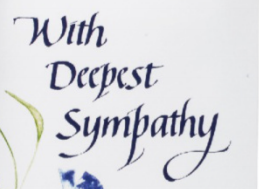On a beautiful, ordinary summer day in 2009, I watched my partner drown.
2009年,在一個美麗的,平常的夏日,我經(jīng)歷了伙伴的溺水。
Matt was strong and healthy—just three months from his 40th birthday.
馬特是個強壯和健康的人-當時離他40歲生日還有3個月。
We had joked that he was half mountain goat, able to scale waterfalls if need be.
我們還開玩笑說,他是半個野山羊,如果需要的話,他可以爬到瀑布上。
There was no reason he should have drowned. It was random, unexpected, and it tore my world apart.
他根本不應該溺水的。這件事情很隨機,出乎意料。
We had gone out to the river on the first sunny day after several weeks of rain.
幾周的降雨過后的第一個晴天,我們?nèi)チ撕舆叀?/div>
Matt went swimming while I stayed in the woods with our dog. When he called out for help, I saw him swept away by a flood-swollen current.
馬特游泳時,我在樹林中和我們的狗在一塊。當他呼救時,我看到他被洪水卷走了。
The dog and I ran in, trying to save him, but were carried two miles downstream.
我和狗狗跑了過來,想去救馬特,但是被帶著往下游走了兩公里。
Search teams found Matt's body three hours later. I thought I knew quite a bit about grief. After all, I'd been a psychotherapist for nearly a decade.
三個小時后,搜救隊發(fā)現(xiàn)了馬特的尸體。我認為我對悲傷很了解。畢竟,我做心理治療師已經(jīng)快10年了。
I had worked with hundreds of people, from those wrestling with substance addiction and patterns of homelessness to private-practice clients facing decades-old abuse, trauma, and grief.
我曾幫助過成百上千個客戶,從那些與藥物成癮和無家可歸的模式作斗爭的人,到那些面臨著幾十年的虐待、創(chuàng)傷和悲傷的私人診所客戶。
After Matt died, I wanted to call every one of my clients and apologize for my ignorance.
馬特去世后,我想給所有的客戶打電話,為我的無知道歉。
With all of my experience and training, if anyone could be prepared to deal with that kind of loss, it should have been me.
我有這么多年的經(jīng)驗和訓練,如果有人能準備好面對那種失去的話,那個人應該是我。
But none of what I'd learned mattered. And I wasn't alone.
但是我學習到的東西都不重要。而且我不是一個人。
In the first years after Matt's death, I slowly discovered a community of grieving people.
在馬特去世后的前幾年,我慢慢地發(fā)現(xiàn)了一個傷心人的社區(qū)。

It wasn't just loss that we had in common.
失去不是我們唯一的共同點。
We shared stories of being encouraged to "get over it," put the past behind us, and stop talking about those we had lost.
我們分享被鼓勵克服難關的故事,把過去泡在腦后,不再談論我們失去的東西。
We were admonished to move on and told we needed these deaths in order to learn what was important in life.
我們被告誡要繼續(xù)前進,并被告知我們需要這些死亡來學習生命中什么是重要的。
Even those who tried to help ended up hurting.
即使那些試圖幫忙的人最后都受傷了。
Platitudes and advice, even when said with good intentions, came across as dismissive, reducing great pain to empty one-liners.
即使是出于好意,陳詞濫調(diào)和建議也會讓人覺得不屑一顧,會被認為是把巨大的痛苦化為一句空洞的俏皮話。
At a time when we most needed love and support, each one of us felt alone, misunderstood, judged, and dismissed.
在我們最需要愛和支持的時候,我們每個人都感到孤獨、被誤解、被評判、被拋棄。
It's not that the people around us meant to be cruel; they just didn't know how to be truly helpful.
不是我們身邊的人有意要殘忍,他們只是不知道怎樣才能真正地提供幫助。
Like many grieving people, we stopped talking about our pain to friends and family.
像許多悲傷的人一樣,我們不再向朋友和家人傾訴我們的痛苦。
It was easier to pretend everything was fine than to continually defend and explain our grief to those who couldn't understand.
假裝一切都好,這要比不停地向那些聽不懂的人解釋我們的悲傷容易得多。











